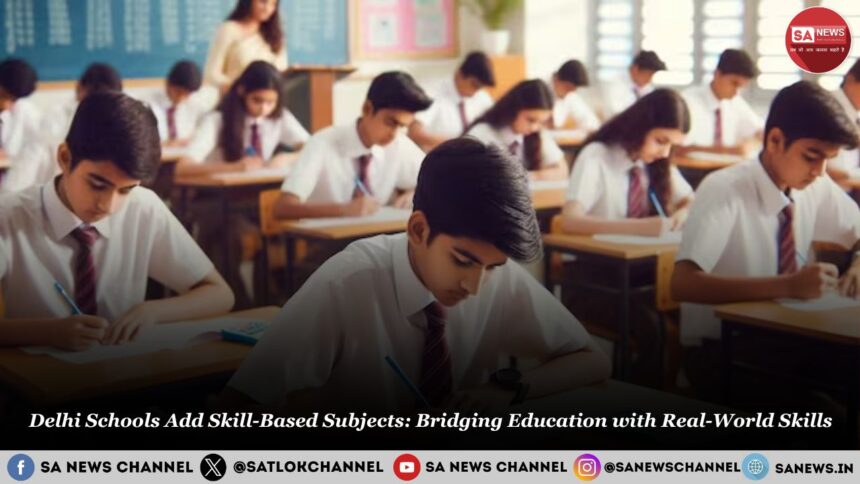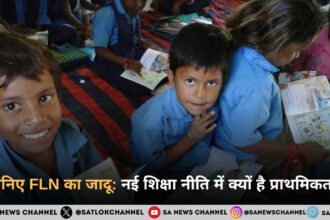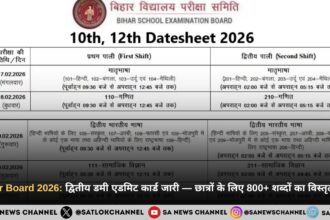In a significant step toward transforming school education in the national capital, the Delhi government has announced the introduction of skill-based subjects in 257 more government schools from this academic session. The initiative aims to align education with real-world industry requirements, ensuring students are better prepared for today’s evolving job market.
- Real-World Skills Meet the Classroom
- Key areas students can explore include:
- Flexible Entry Points for Students
- Teachers, Training & Infrastructure: The Real Test
- A Broader Push Toward Holistic Learning
- A Promising Shift: Needs Careful Navigation
- From Employment to Enlightenment: A Holistic Vision for Education
- A Humble Appeal to Authorities
- Delhi Schools Add Skill-Based Subjects FAQs
This expansion has been approved by the Directorate of Education (DoE) and brings the total number of Delhi government schools offering at least one vocational subject to over 800. The initiative falls under the centrally sponsored Samagra Shiksha scheme and aligns with the broader vision of the National Education Policy (NEP) 2020.
Real-World Skills Meet the Classroom
The core objective is to integrate traditional learning with hands-on, practical exposure. Starting from Class 9, students can now choose from a wide array of skill-based courses, many of which have been designed in collaboration with industry professionals and national educational councils.
To ensure personalized attention, each course will be offered to batches of up to 50 students per school. This smaller group format allows deeper engagement and interactive learning without overwhelming classroom resources.
Key areas students can explore include:
- Information Technology
- Retail and Sales
- Healthcare and Wellness
- Beauty and Personal Care
- Artificial Intelligence (AI)
- Entrepreneurship (via Delhi’s NEEV program)
- Governance Studies (offered as Rashtraneeti)
- Science of Living (mindfulness, yoga, emotional well-being)
Flexible Entry Points for Students
The DoE has clarified that students entering Class 11 may also opt for vocational subjects even if they haven’t studied them previously. This decision enhances flexibility and ensures students aren’t penalized for earlier academic choices.
Schools are also expected to conduct orientation sessions for both students and parents to explain the relevance, benefits, and future career potential of these courses. This aims to dismantle the long-standing bias that views vocational education as a “second-tier” option.
“We want students to see that learning a skill isn’t a fallback option, it’s a gateway to new opportunities,” said a senior education department official.
Teachers, Training & Infrastructure: The Real Test
While the policy shift has received praise from educationists and parents alike, the real challenge lies in execution. Many secondary schools already face a shortage of core subject teachers. Now, they must also hire and train vocational instructors, many of whom require industry-specific expertise.
Additionally, schools need to upgrade infrastructure labs, equipment, and digital tools to support experiential learning. Tie-ups with relevant industries will be essential for providing real-world exposure.
“This is undoubtedly a progressive step,” said Ritu Mehra, Principal of a Delhi government school in East Delhi. “But without trained faculty and functional labs, student interest may fade, and the initiative could lose its impact.”
To address these concerns, the Delhi government is expected to issue guidelines for teacher training, recruitment of vocational experts, and integration with mentorship programs like Desh Ke Mentor.
A Broader Push Toward Holistic Learning
This reform aligns with a broader transformation in Delhi’s education system. Notable programs such as the Happiness Curriculum (focused on emotional intelligence) and the Deshbhakti Curriculum (instilling civic responsibility) show the government’s commitment to shaping well-rounded individuals.
Also Read: Bomb Threats in Six Delhi Schools Trigger Panic, Second Incident This Week
The addition of skill-based subjects strengthens the goal of NEP 2020: to merge vocational and academic learning, ensuring holistic student development.
A Promising Shift: Needs Careful Navigation
While the policy is ambitious, its success hinges on meticulous implementation. Regular monitoring, transparent feedback mechanisms, and timely course corrections are crucial to maintain quality and equity.
“This is a landmark reform,” noted Prof. Anil Tiwari, an education policy researcher. “But for true democratization of opportunity, the government must ensure a child in outer Delhi gets the same training quality as one in a central, well-equipped school.”
For now, the move signals a positive shift in Delhi’s education landscape, one that acknowledges that knowledge and skill must go hand-in-hand to create a future-ready generation.
From Employment to Enlightenment: A Holistic Vision for Education
From Employment to Enlightenment: A Complete Vision for Education
Delhi’s push toward skill-based learning is a bold and much-needed reform. It acknowledges that education must go beyond textbooks and help students build careers. However, an essential question remains: Is preparing students for jobs enough? What about preparing them for life?
This is where the teachings of Sant Rampal Ji Maharaj offer profound insight. He explains that true education is not limited to acquiring technical skills or earning degrees. The real purpose of human life is far greater; it is to recognize the Supreme God, Kabir Saheb, and to attain salvation (moksha) through His worship. Education, in its truest form, should guide students not only toward employment but also toward enlightenment.
Imagine an educational system where students learn artificial intelligence and entrepreneurship, but also practice truth, non-violence, humility, and self-discipline. What if emotional wellness was not just a curriculum subject but a natural outcome of understanding the soul’s purpose? Such a blend of skill and spiritual wisdom would create not just professionals, but responsible, peaceful, and awakened human beings.
Sant Rampal Ji Maharaj emphasizes that life’s ultimate goal is to escape the cycle of birth and death, which is only possible through devotion to Supreme God Kabir Saheb as described in our holy scriptures. His spiritual knowledge clarifies that human birth is precious and rare, and it must not be wasted only in chasing worldly success.
Hence, while skill education equips students for this world, spiritual education prepares them for the eternal one. Together, they form a balanced, meaningful, and holistic system of learning. This is not a fantasy, it is the next natural step in true educational reform.
The future of education should be where skill meets soul, and where learning not only builds careers but also elevates consciousness. That’s when education will be truly complete.
A Humble Appeal to Authorities
In view of the immense spiritual, moral, and societal benefits, we earnestly request the educational authorities to consider adding the books written by Sant Rampal Ji Maharaj to the school curriculum. Doing so would not only enrich the minds of students with divine wisdom but also shape a value-driven, peaceful, and spiritually awakened generation.
The time has come for education to go beyond skills, toward soul empowerment. Let us give our youth the knowledge to succeed in the world spiritually and the wisdom to transcend it.
Delhi Schools Add Skill-Based Subjects FAQs
1. What is the main objective behind introducing skill-based subjects in Delhi government schools?
The main objective is to equip students with job-ready, industry-relevant skills and prepare them for future careers.
2. From which class will students be able to opt for these new skill-based subjects?
Students can choose skill-based subjects from Class 9 onwards.
3. How does the program align with the National Education Policy (NEP) 2020?
It integrates vocational training into mainstream education, promoting holistic development and practical knowledge alongside academic learning.
4. What challenges do schools face in implementing skill-based education?
Challenges include recruiting trained vocational instructors, building necessary infrastructure, and ensuring equal access to quality training.
5. What is the ultimate goal of real education?
True education aims not only at employment but also at spiritual upliftment attaining salvation through the worship of Supreme God Kabir Saheb Ji and living with truth, humility, and compassion.









